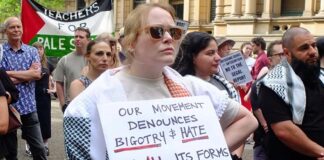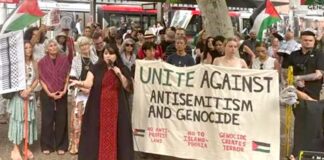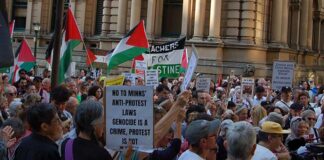Israeli politics is becoming more racist and right-wing as a result of its foundation as a settler state based on Palestinian dispossession, argues James Supple
Israel’s election in November saw right-wing leader Benjamin Netanyahu return to office, after the coalition that replaced him collapsed after just over a year in power. His new government will be even more right-wing than before, including parties committed to extreme racism against Palestinians.
Netanyahu has become the dominant figure in Israeli politics, as Prime Minister almost continuously since 2009. A warmonger and strong supporter of Donald Trump, he announced plans to formally annex large areas of the occupied West Bank, which would make any future peace settlement with the Palestinians impossible.
Netanyahu openly supports racism and apartheid against the Palestinians, declaring that, “Israel is not the state of all its citizens. According to the Basic Law that we passed, Israel is the nation-state of the Jewish people—and its alone.”
After some of his previous right-wing allies abandoned him, Netanyahu brokered a deal last year between small extremist parties to run under the Religious Zionism list. They are now the third biggest party in the Knesset, Israel’s parliament.
One of the grouping’s leaders is Itamar Ben-Gvir, a far-right figure who came out of the viciously anti-Arab Kach party, which was banned after one of its members, Baruch Goldstein, massacred 29 Palestinians at a mosque in Hebron. Ben-Gvir has repeatedly praised Goldstein and hung a portrait of him in his office.
He openly calls for the expulsion of Palestinians living inside Israel who are not “loyal” to the idea of a Jewish state and wants the annexation of the West Bank under a regime of explicit apartheid, where Palestinians would have no right to vote.
Israeli politics is becoming more and more ultra-nationalist and right-wing. Even the opposition to Netanyahu, like the party led by Yair Lapid, wants peace with the Palestinians only on terms of abject humiliation.
Over time the mainstream “left” in Israeli politics has become more and more marginal. The Labor Party, once dominant, is a shadow of its former self.
The Meretz party, seen as the representative of the peace movement, has won less than 5 per cent at every election since 2003 and is now without a single parliamentary seat. And even Meretz is a Zionist party that ultimately sides with the state against the Palestinians.
Settler-colonial state
Gideon Levy, a well-known Israeli critic of the occupation and journalist at the Ha’aretz newspaper, wrote that Israeli Jews who oppose Zionism and are prepared to live on equal terms with Arabs “comprises all of a fraction of one per cent” of the population.
The bulk of Israeli society embraces extreme racist attitudes towards the Palestinians.
Last year’s assault on Gaza showed anew Israel’s brutality. In less than two weeks 256 Palestinians were killed and Gaza’s buildings and infrastructure devastated again in the fourth major bombing campaign since 2008.
Yet on the day the ceasefire was agreed, an opinion poll found that almost three-quarters of Israelis believed the bombing should continue. A separate poll last year found 62 per cent of Israeli Jews agreed that “Arabs only understand force”. A poll in 2015 found almost half of Israeli Jews believed that Arabs should be expelled from Israel completely, where they are around 20 per cent of the population, and 79 per cent said Jewish citizens deserved “preferential treatment”, effectively endorsing racist discrimination.
All this is the result of Israel’s foundation as a settler-colonial state based on imperialist domination and racial exclusion. This project, which remains reliant on massive support from US and Western imperialism, has fostered a violent hostility to Palestinians.
Zionism, the idea that the Jewish people had a right to establish their own exclusive state in Palestine, is the founding ideology of Israel.
This was only possible through seizing the land from the Palestinian Arab population that already lived there.
Although Zionist settlers began arriving in Palestine from 1882, they recognised that their cause needed the sponsorship of a great power, which they eventually found in Britain, the leading European colonial power of the day.
After the First World War Britain took control of Palestine and allowed a rapid increase in Jewish settler migration.
The Zionists sold themselves to Britain as a dependable European colonial population, with Theodor Herzl, the founder of modern Zionism, commenting that they would be “a part of the wall against Asia and serve as the vanguard of civilization against barbarism”.
The Israeli state was eventually established through the dispossession and ethnic cleansing of around 700,000 Palestinians in 1948. Even today any Jewish person has the right to migrate to Israel and claim citizenship under the law of return.
Yet the right of return for Palestinian refugees expelled from their homes is denied and Israel continues to grab more and more Palestinian land.
Change from inside Israel
Socialists argue that workers everywhere have an interest in fighting oppression and imperialism. But from early on, the nature of the settler-colonial project ensured that Jewish workers and their organisations put nation building before class.
Jewish workers gained significant material benefits from their support for settler-colonialism and the Israeli state. To ensure Jewish settlers remained in Palestine, the World Zionist Organisation forged an alliance with Jewish workers’ organisations to ensure that they received a “European standard of living” higher than that of Palestinian Arab workers.
To achieve this, the Zionist trade union federation, the Histadrut, organised to exclude Palestinians from the labour market. More than a trade union, it operated as a “state in embryo” running businesses as well as providing workers’ social needs like banking, housing and education.
When Israel was established its leaders took control of the state, through the Labor Party and its predecessor Mapai, continuing the same approach, underpinned by capital transfers sent to Israel from abroad.
After the British withdrawal from Palestine following the Second World War, Israel received support from a range of imperialist powers. In the 20 years after its creation it received $7 billion in capital investment from the West, most if it in the form of aid. According to British socialist Tony Cliff this was equal to almost $3000 per person per year, higher than the profits Britain drew per person from imperialism at the height of its empire.
Privatisation and cuts to the welfare state since the 1980s have brought an increase in inequality. But this has not led even a section of the working class to break with settler-colonialism.
In 2011 there were demonstrations of almost 500,000 Israelis nationwide against the cost of living and housing. But at no point did the movement challenge the huge levels of government spending on the military or the occupation of Palestinian territories seized in 1967, let alone the broader racism and discrimination against the Palestinians.
The way Israel’s population has grown through Jewish migration, including Mizrahi Jews from countries like Iran, Iraq and Egypt who arrived after 1948, and those who arrived from Russia in the 1990s, has reinforced racist nationalism. Despite making up the poorer sections of the Jewish Israeli working class, the more recent Jewish migrants have sought to intensify the dispossession and racism against the Palestinians instead of turning their rage against wealthy Israelis.
US backing
Israel remains an imperialist outpost, dependent on support from outside powers. Following Israel’s victory over the Arab states in the 1967 war, the US became its key imperialist sponsor.
Israel in turn acts as a “watchdog state” for US interests in the Middle East. This has helped entrench militarism within Israeli society.
The country has received around $190 billion in US aid since 1945, more than any other country.
This allows Israel to maintain a “qualitative military edge” over other states in the region through access to high-tech military equipment.
And as British socialist Anne Alexander writes, it has also had other spin-offs for Israel’s economic development: “These huge subsidies turned the ‘burden’ of military spending into a means to attract further external sources of funding. They also played a critical role in laying the basis for the boom in hi-tech and research-intensive manufacturing and services.”
These industries deliver high-wage jobs for Israeli workers.
The colonial war for control of Palestine has never ended, with Palestinian military resistance from the PLO and Hamas still ongoing. The process of dispossession is also ongoing, through settlement building and the seizure of land in the territories Israel occupied in the 1967 war in the West Bank, Gaza and East Jerusalem.
This means that Israel’s relationship to the Palestinians remains the dominant issue in Israeli politics. Military control of the occupied territories has a major ideological impact inside Israel, due to the role of settlers in Israeli politics and the compulsory military service which sees many young Jewish Israelis spend time as part of the occupation force in the West Bank.
All this means there is no significant social force inside Israel that offers any hope for change. The material interests of the Israeli working class are bound to the Israeli state similarly to the way those of the white working class of South Africa were tied to the apartheid state.
The key to winning Palestinian liberation lies outside Israel—in the working class across the wider Middle East.
Despite the complicity of the Arab ruling classes with imperialism, the Arab population still strongly supports the Palestinians. Solidarity with Palestine was a key issue around which Egyptian workers organised against the Mubarak dictatorship before their revolution brought him down in 2011.
In what was termed the Arab Spring, workers in Egypt and Tunisia in particular showed their power to potentially reshape the region.
The revolutions of 2011 failed to grow over from a fight for democracy into a fight against capitalism and imperialism. But further revolts in the future are inevitable. It will require a revolutionary struggle across the whole region to liberate Palestine along with the wider Middle East from imperialist control.






